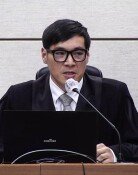How was budget for 2001 formulated?
How was budget for 2001 formulated?
Posted September. 05, 2000 15:16,
The budget proposal which the government has submitted to the ruling Millennium Democratic Party for the upcoming inter-Party negotiation is an austerity budget hard to see in recent days. Although the budget sought has crossed the 1 trillion won threshold, the proposed budget seeks 1.1 trillion in spending, in accordance with the task at hand to reduce the national debt, the budget increase is 2 - 3% lower than the expected increase of the economic growth rate of 8 - 9%. Especially noticeable of government`s austerity is the fact that while the major publicly financed construction projects such as Inchon International Airport, are nearing completion, the current budge lacks new Social Overhead Capital project financing.
- The emphasis of the austerity budget
According to proposed budget plan for next year, the total expected budgetary spending is 101 trillion won, 6 trillion won higher than this year`s total budget including the supplementary budget allocation. The government also through continued support of economic recovery and a greater crackdown on illicit earnings and tax evasions expects to increase the government`s annual tax income by 16 - 17 trillin won. However, the increased tax earning will be applied toward the national debt relief by decreasing the issues of bonds floated by the government. The government hopes to lower the current 11 trillion won national debt to 3 - 4 trillion won by next year and thereby lower the integrated finance index deficit from 3.4% to 1.5%, in anticipation of next year`s GDP.
According to the proposed budget, an unavoidable budgetary increase of 5.4 trillion won was assigned to the independent provincial governments lacking adequate independent financial support. Additional 3 - 3.5 trillion won increase was assigned for the betterment of civil servants, payment of interest on national debt; and 2 trillion won for standard of living guarantee for the citizenry, developmental research and promotion of information society. The total unavoidable budgetary increase was pegged at 10-11 trillion won. Especially noticeable was the budgetary increase in subsidy for the independent provincial governments and education budget. .
For the necessary 11 trillion won budgetary increase, the government proposes to allocate 6 trillion won from the increased soluble treasure income resulting from the expected growth in national income. The government also proposes to cut 1.5 trillion budget allocation for temporary expenditures which had greatly increased in the wake of the economic crisis such as public fund injections and support for public works. Another cut will be 1.4 trillion won for maintenance of national treasures and government funded loans, and a contribution of 1 trillion won from special tax revenues.
- Budget allocated for information technology and science according to the shift in economic paradigm
The government has markedly increased the budget for long term projects in the area such as the information technology and bio-technology. In order to come shoulder to shoulder with other G7 nations, the governmnet has greatly increased the research and development support budget and greatly curtailed the financial support of existing fields.
The government has increased its budget from 424 billion won to 717 billion won and has also allocated 200 billion won for foundational elementary research, 826 billion won for industrial science development and 718 billion won for 52 research centers and 5 research association. In hopes of becoming one of the top 10 nations in information and academia, the government proposes to invest 256 billion won for the laying of the high-speed information network infrastructure, 85 billion won for promotion of the cutting-edge information industry, 35.1 billion won for prevention of side effects of the information society, and 71.1 billion won in order to supply computers to those who cannot afford them.
In order to provide a supply of clean water, the government also proposes to spend 374.9 billion won for the water treatment four major rivers and sewage treatment facilities. The government will also earmark budgetary spending for the develop of tourism through such investments as 50 billion won for the southern coast tourism development, 23 billion won for the preservation of Confucian cultural heritage in Gyeonggi area.
Will a balanced budget be possible?
Whether the government could indeed succeed in its proposed goal to balance the budget through reduction of national debt by year 2003 is doubtful in light of the proposed budget. Although it is understandable that the spending increase is lower than the expected economic growth rate, there are certain adverse side-effects. While the public sector is experience a spurt in growth, the government`s tightening its budgetary belt will not so nicely solve the budget deficit problem, nor can anyone expect the proposed budget to glide through the National Assembly without fierce head-wind.
Lee Hoon dreamland@donga.com






![“설거지해도 그대로”…냄비 ‘무지개 얼룩’ 5분 해결법 [알쓸톡]](https://dimg.donga.com/c/138/175/90/1/wps/NEWS/IMAGE/2026/01/15/133164664.3.png)
